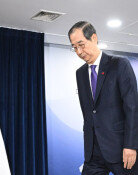Ruling, opposition need to engage in fierce tax policy debate
Ruling, opposition need to engage in fierce tax policy debate
Posted November. 15, 2021 08:13,
Updated November. 15, 2021 08:13
The ruling Minjoo Party of Korea plans to embark on discussions in the National Assembly today on a bill to lessen standards of transfer income tax on those who own one house. Presidential candidate of the ruling party Lee Jae-myung says that he agrees on the general consensus on transfer income tax within the party. By contrast, the main opposition People Power Party and its presidential candidate Yoon Seok-youl argue for the lessening of real estate transfer tax and comprehensive real estate tax. A heated debate is expected to unfold in the National Assembly.
A proposed bill on a reduced real estate transfer tax is a follow-up measure of the general meeting of the Assembly members in June to lessen standards of high-value homes from a market value of 900 million won to 1.2 billion won. Despite critical voices from inside that the decision runs against President Moon Jae-in’s policy note, the ruling party has no option but to have a possible backlash of taxpayers in mind when they receive tax bills on their ownership of real estates as a whole late this month. In the same vein, ruling party’s presidential candidate Lee may have sided with the party regarding this matter. On the other hand, the main opposition party and its presidential candidate Yoon maintain that real estate transfer tax should be tentatively reduced by 50 percent on owners of multiple homes to encourage more houses to be put on the market.
Controversy over comprehensive real estate tax will only increase across the two main political parties of the nation when taxpayers receive a bill with a way higher tax rate applied to those who own multiple homes next Monday. Yoon publicly pledged on his social media account to lessen burden of comprehensive real estate tax, saying, “I’d like to integrate comprehensive real estate tax in property tax or give tax exemption benefits to those who possess one house.” On the contrary, Lee intends to create a national land holding tax on every individual who owns homes and land while integrating the system of comprehensive real estate tax into this new tax item to increase the effective tax rate from 0.17 percent to 1 percent.
The lessening of real estate transfer tax on those with one house is a pledge in front of voters made by the ruling party to quell public dissatisfaction after its total failure at the April 7 local elections. Given that the average sale price of apartment units located in Seoul reached 1.22 billion won as of October, there is a great gap from the standard of transfer income tax of 900 million won, which has remained unchanged over 14 years. Added to this, owners who only have one house suffer a high level of tax burden. All of this makes it urgent to proceed with a tax reform. Meanwhile, the government opposes experts’ advice that a reduced transfer income tax on those who own multiple houses can help normalize the real estate market, arguing that such a revamp will not help increase the number of houses available on the market, which will automatically spark controversy. Additionally, the system of comprehensive real estate tax is a bone of contention that will be met with a fiercer debate. Lee argues that the current tax item should be included in a newly proposed tax item of national land holding tax to increase holding tax on those who have an unnecessarily large amount of properties while Yoon maintains that comprehensive real estate tax and property tax should be integrated to reduce tax burden overall.
“Many issues arising in the real estate market have left many citizens frustrated and enraged,” said Lee apologizing for a real estate policy failure of the incumbent Moon administration. Yoon criticized that the administration is supposed to be held accountable for spikes in housing prices, which is no different from the plunder of assets. If political leaders agree that the incumbent administration’s complete failure in the real estate market is the main culprit behind the skyrocketing real estate prices and house rents that have made things hard on those who do not own any house and young generations, they should raise their voice in a fierce policy competition to show a deliberate and well-considered vision and solutions in an effort to stabilize the housing market and resolve housing issues.







